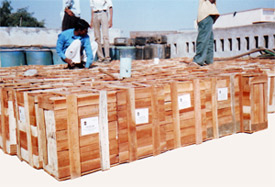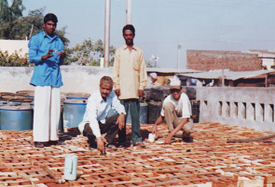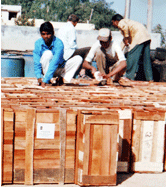Descaling Chemicals
We are Manufacturer, Supplier, Exporter, Jobwork Services Provider, Dealer, Distributor of Descaling Chemicals from Nashik, Maharashtra, India. As a leading Turnkey Contractor; we do Jobwork Services / Turnkey Contracts for Descaling of Air Compressors, Industrial Boilers, Heat Exchangers, Oil Coolers, Condensers, Arc Furnaces, Continuous Casting Machines, Industrial Pipelines, Cement Plant Pipelines, Reaction Vessels, Industrial Coils, Injection Moulding Machines, etc.
Descaling chemicals are specialized cleaning agents designed to remove mineral deposits, such as calcium, magnesium, and limescale, from surfaces in pipes, boilers, heat exchangers, and other equipment. These chemicals typically contain acids like hydrochloric acid, citric acid, or sulfuric acid, which dissolve the scale buildup. They help restore the efficiency and functionality of systems affected by hard water deposits, preventing corrosion and improving heat transfer. Descaling chemicals are commonly used in industries like water treatment, HVAC, and food processing. Proper usage of these chemicals ensures the longevity of equipment and reduces energy consumption.
Purpose of Industrial Machines / Equipments Chemical Cleaning Jobwork Services / Turnkey Contracts :
The primary reasons for chemical cleaning of industrial boilers / heat exchangers are to prevent tube failures & improve unit availability. Tube failures in low pressure boilers / heat exchangers are normally the results of creep which occurs when internal deposits produce excessive metal temperature. A relatively smaller quantity of deposit creates difficulties in high pressure boilers. Caustic corrosion & hydrogen damage, which occur only in the presence of deposits, may cause tube failures at temperatures well below the creep limit. Deposits originating both from fabrication & during operation should be considered potential problems.
All the pressure parts of steam generator may be subjected to heat treatment of some sort during fabrication or erection – during forming operations, stress relief, welding or bending. Whenever carbon low alloy steels are subjected to high temperatures in the presence of air, oxidation occurs, the oxide produced is known as mill scale. Mill scale on boiler / heat exchanger tubing is normally very thin with the exception of areas near welds & bends. Even where mill scale is initially uniform its brittleness upon cooling may produce flaking. The resulting non-uniform surface is undesirable from the standpoint of corrosion susceptibility. During operation mill scale is rapidly eroded from the steam generating surfaces & may subsequently be redeposited in critical areas. Preoperational acid cleaning removes mill scale & serves to remove atmospheric rust which inevitably accumulates to some degree during erection.
After a boiler / heat exchanger placed into service, numerous solid constituents may enter the units with the feed water & some portion of the insolubles can be expected to deposit on surfaces. If not removed these deposits accumulated over a period of time can minimize the quantity of these materials; however, complete freedom from deposition is not possible in a high pressure system. The need for occasional chemical cleaning during the life of the equipment has become a recognized fact & should be accepted as a routine maintenance practice. A frequency of service cleaning of every 3 to 4 months is recommended. This frequency should be increased if individual unit operating history dictates.
Scaleflow, Scaleclean - A is a revolutionary descaling agent. In other words, it is inhibited acid for general use in all types of chemical descaling operations. It removes water hardness scales, deposits from steam and hot water, mill scales, weld scales, moulding, foundry deposits and many other types of foreign residues on metals.
Scaleflow, Scaleclean - A in addition to the inhibitors also incorporates wetting agents to assist the solvent action of the acids on the deposits to reduce 'drag out' losses, absorption of inhibitors by scale, rust and helps the solution to penetrate into inaccessible regions.
"SCALECLEAN - A" is a liquid preparation with Acid base, designed to dissolve industrial deposits without affecting metals. "SCALECLEAN - A" is supplied in fully inhibited & concentrated form & is to be diluted with water for use. In general, any type of equipment on which scale has been deposited, can be cleaned by using 'SCALECLEAN - A'. This chemical is specially developed for removal of soft scale.
"SCALEFLOW" is specially developed for removal of hard scales like silicate of calcium, magnesium, sulphates, carbonates etc. "SCALEFLOW" is supplied in fully inhibited & concentrated form & is to be diluted with water for use. This chemical is meant especially for hard scale.
"NEUTRAFLOW" is a liquid preparation with an Alkali base. The Neutraflow treatment has the effect of swelling up the scales through hydrolysis of the scale components. The result is that the subsequent "SCALECLEAN - A" or "SCALEFLOW" treatment becomes faster & proper.
"ALGEINE" is a liquid preparation with acidic base, designed to prevent formation of Algae in cooling tower etc. This chemical is supplied in fully inhabited & concentrated form & is to be diluted with water.
Scaleclean - A & Scaleflow contains HCL as principal agent. Although many acids namely Sulphuric, Sulfamic, Citric, can be used for removal of scales, but Hydrochloric offers the following definite advantage over others :
• Calcium Chloride, Iron Chloride, etc. which are formed by reaction of scales are highly soluble with HCL in water.
• The time taken for the solution of rust or scale is minimum in HCL as compared to that required by other acids.
• The solution rate of mill scale is 10% to 27% higher in 10% & 5% HCL, respectively than in similar solutions of Sulphuric Acid.
• A dark slime or smut left on metal surface pickled in other acids is not present when HCL is used.
• No heating is required during cleaning with HCL as the acid dissolves the scale at normal temperature.
• During pickling in HCL the scale is directly dissolved by the acid & the ‘mechanical effect' of removal of scale by Hydrogen bubbles
(formed by reaction between metal & acid), is not required. Accordingly HCL can be inhibited with strength inhibitors.
• The degree of Hydrogenation & consequently Hydrogen embrittlement are absent when HCL is used.
• The tolerated Iron content in pickling solution is higher when HCL is used.
• The corrosive action of HCL on clothing & skin is milder.
Corrosion inhibitors are used in descaling acid to essentially prevent the attack on metal equipment when scale is removed. There are several other advantages of inhibitors which are given below :
1. Saving valuable metal.
2. Saving acid.
3. Reduction of acid fume.
4. Prevention of Hydrogen blisters, Hydrogen cracking & Hydrogen embrittlement.
5. Preve ntion of pitting & other surface roughness resulting from acid attack on metal.
| METAL | HCL | SCALECLEAN - A / SCALEFLOW |
|---|---|---|
| ALUMINIUM | 0.03997 | 0.000056 |
| BRASS | 0.000032 | 0.000008 |
| CAST IRON | 0.00644 | 0.00484 |
| COPPER | 0.00004 | 0.000024 |
| MILD STEEL | 0.00072 | 0.000032 |
| STAINLESS STEEL (304) | 0.00022 | 0.000016 |
| ZINC | 0.3582 | 0.00166 |
In general any type of metallic equipment on which scale has been deposited can be cleaned by Scaleflow, Scaleclean - 'A'. Typical examples of equipments are Boilers, Economizers, Super Heaters, De-aerators, Vents, Condensors, Stage Heaters, Heat Exchangers, Surface Condensors, Feed water treating equipments, valves, and miscellaneous equipments, pipelines, water mains, oil wells, equipment used for acidizing of oil wells (to improve yields of oil from oil bearing lime stone formations), air-conditioning equipment, canteen equipment, stabilizers, electric boilers, kettles, surgical instruments, immersion heaters, heating coils, sugar and caustic evaporators, black liquor evaporators in the pump industry, railway carriages and bus bodies, brewery equipments, steel strips and sections requiring pickling, cold drawings etc.
1st Stage : Take "NEUTRAFLOW" and mix with water in the ratio of 1:6 (One litre of NF and six litres of water). Circulate the solution or immerse the equipment in this solution for 2 hrs. This will be helpful in loosening the rock hard scale. This will also help to remove oil & grease from the surface.
2nd Stage : Flush the entire system with ample fresh water, at least for 15 to 20 minutes.
3rd Stage : "SCALEFLOW" and mix with water in the ratio of 1:6 (One litre of SF and six litres of water). Circulate the solution or immerse the equipment in this solution for 6-8 hrs.
4th Stage : Flush the entire system with ample fresh water, at least for 15 to 20 minutes.
5th Stage : Take "NEUTRAFLOW" and mix with water in the ratio of 1:6 (One litre of NF and six litres of water). Circulate the solution or immerse the equipment in this solution for 2 hrs.
6th Stage : Flush the entire system with ample fresh water, till the ph of inlet & outlet of fresh water matches. The information contained in this technical bulletin is adequate for common descaling problems, but in case further information is required, please write to us giving details of equipments to be de-scaled and type of scale encountered.
Box Packing



